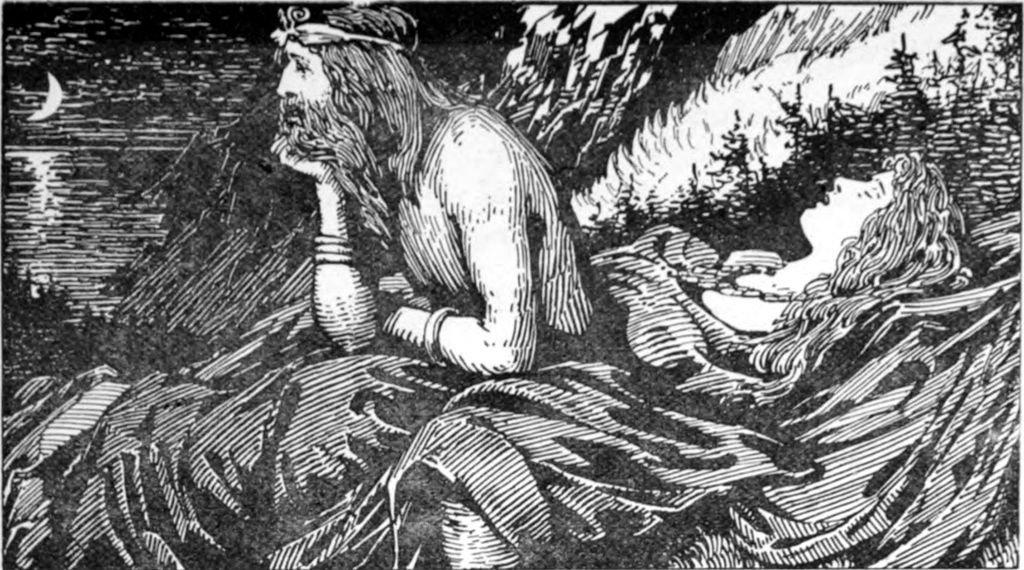One of the principal gods of the Vanir tribe of Norse deities, Njord is the Norse god of the sea and wind, particularly associated with wealth, the sea, fertility and seafaring in Norse mythology. Njord was a popular god among the Norse seafarers and hunters in particular. Those who worshiped the Norse God of The Sea did so hoping to receive bounty from the seas.

Njord, also known as Njordr led the Vanir tribe of gods against the Aesir gods during the Aesir-Vanir War. He was later sent to the Aesir tribe of gods along with his son, Freyr, and his daughter, Freya as part of the peace settlement, moving from Vanir’s realm of Vanaheim to Asgard. Eventually, Njord and his children became accepted and even admired by the Aesir, becoming honorary members of the Aesir tribe of gods. The Norse god of the sea is one of the dew major gods set to survive the cataclysmic destruction of the world during Ragnarök along with Thor’s children Thrud, Magni, and Modi.
Family
No information about Njord’s parents survives in any of the Norse sources. It appears as if his existence may have always been taken for granted. Njord has two children with his unnamed sister, Freyr the god of kingship, peace, fertility, and rain, and Freya, the Norse goddess of love and fertility. He was also married to the giantess Skadi for a while but the couple later parted ways.
Njord’s unnamed sister according to linguistic evidence can be Nerthus, anglicized as Hertha. She was a prechristian Germanic goddess of rebirth, kinship, health, longevity, and tradition. Considering her attributes and the similarity in names, Nerthus can be seen as closely associated with the Vanir deities or even as a “proto-Vana” goddess.
The name Nerthus bears a striking resemblance to the Old Norse name of the god Njord, which suggests a potential connection between the two. In fact, if the Proto-Germanic name Nerthus were to be translated into Old Norse, it would closely resemble the name Njord.
Attributes
Njord, a prominent figure in Norse mythology, held a special association with wealth, fertility, the sea, and seafaring in the beliefs of the Vikings. The Norse people even had a saying likening exceptionally wealthy individuals to being “as rich as Njord.” As the god of wind and waters, and as the one who governed the destinies of fishermen, Njord resided in close proximity to the sea. It is believed by some scholars that his dwelling place, known as Nóatún, meaning “the place of boats,” was located above the sea, emphasizing his deep connection with maritime activities.
Njord in Norse Sources
In the Poetic Edda, the ancient Norse texts, Njord is depicted as a survivor of Ragnarok in the Vaftprudnismal poem. Another poem, Grimnismal, portrays him residing in Noatun as a benevolent and magnificent god. He is recognized as the father of Freyr and the husband of Skadi.
In the Lokasenna poem, there is an exchange of insults between Loki and Njord, while the Thrymskvida poem mentions the Norse God of The Sea as Freyja’s father. The Solarljod poem refers to Njord as having nine daughters, and the Skirnismal poem also features his presence. In the Prose Edda, Njordr appears in the books Gylfaginning and Skaldskaparmal, as well as in the Egils saga.
The Marriage of Njord and Skadi
One of the most well-known tales in Norse mythology revolves around the marriage of Njord and Skadi. According to Snorri Sturlson’s Prose Edda, the story unfolds as follows: Skadi’s father, Thjazi, was killed by Odin, Loki, Thor, and the other Aesir after he abducted Idun. Fueled by anger, Skadi sought vengeance and made her way to Asgard.
However, Odin convinced her to reconsider and accept their offerings as a gesture of reconciliation. As part of the agreement, Skadi was granted the opportunity to choose a god as her husband, but with a twist. She had to select her partner by examining only their feet behind a curtain. Believing she had chosen the feet of Baldur, the most beautiful god, Skadi discovered she had actually chosen Njord, and they were wed.
The union between Njord and Skadi did not fare well, as they clashed over their preferred living environments. Skadi longed for the mountainous highlands of Thrymheimr, her father’s homeland, while Njord yearned for the serene coastal atmosphere of Nóatún. Thrymheimr proved gloomy and inhospitable to Njord, with its cold and elevated location. Similarly, Skadi found Nóatún unpleasant due to the constant noise of seabirds, making it difficult for her to sleep.
Eventually, Skadi departed to reside in the mountains of Thrymheimr, embracing a life of hunting and exploring. Meanwhile, Njord remained in Nóatún, fulfilling his duty of safeguarding the seas and those who traversed them.
Continued Worship
The veneration of Njörðr continued to persist in Norwegian folk traditions well into the 18th and 19th centuries. In these practices, the god was referred to as Njor and was honored for granting plentiful catches of fish.
Scholar Georges Dumézil highlights the existence of numerous stories about havmennesker, who was believed to possess authority over sea-related weather, prosperity, and, in certain instances, even bestow enchanted boats. Dumézil suggests that these tales are likely connected to the historical worship of Njörðr, emphasizing the enduring influence of the god within Norwegian culture.
A lot more sources of ancient norse religion survived compared to other pre-christian religions of Europe. Therefore, the worship of Njord has persisted even in the 21st century with the revival of Norse Paganism.
Also Read: Norse Water Deities: The Norse Gods of Water, Ocean, and Sea
